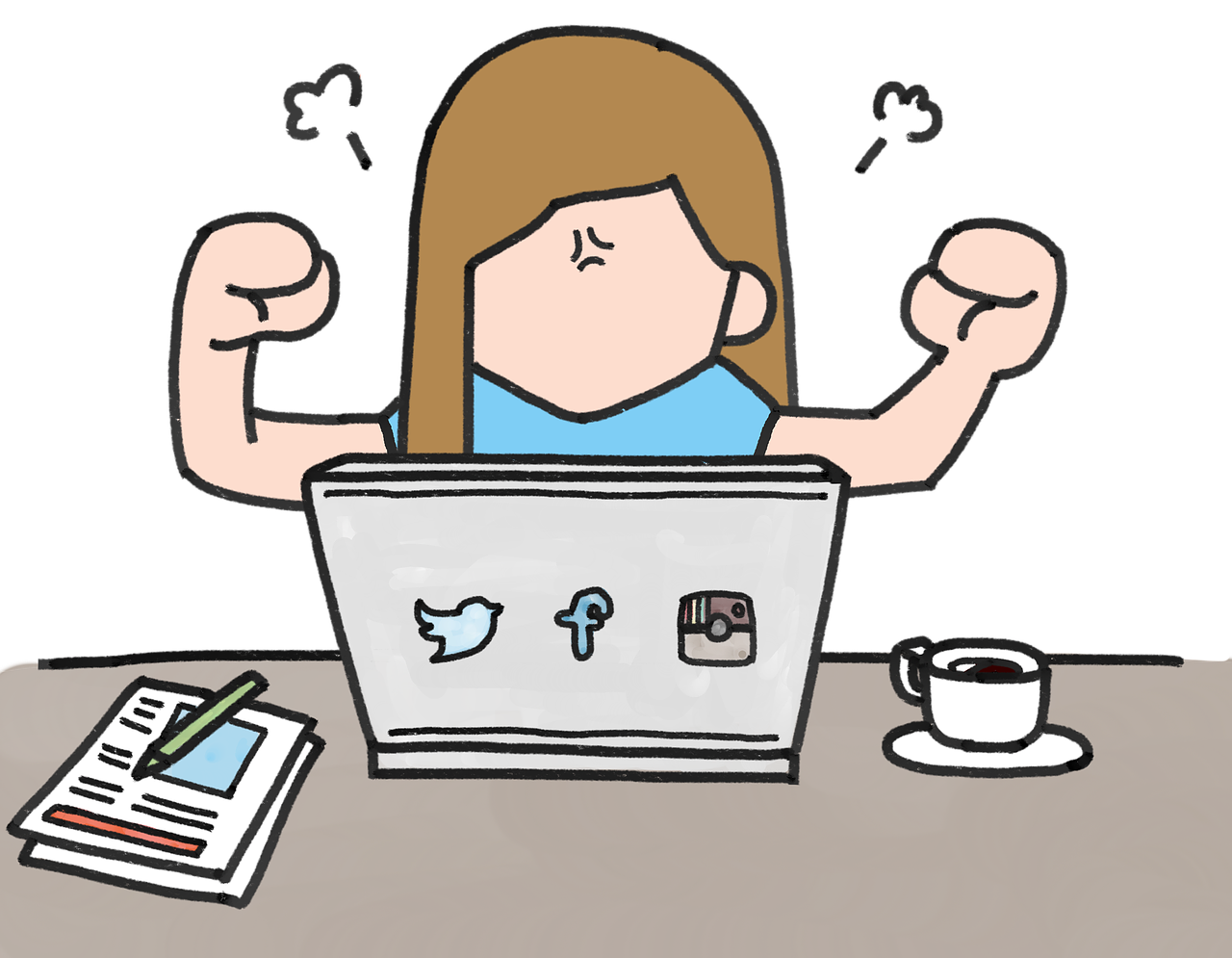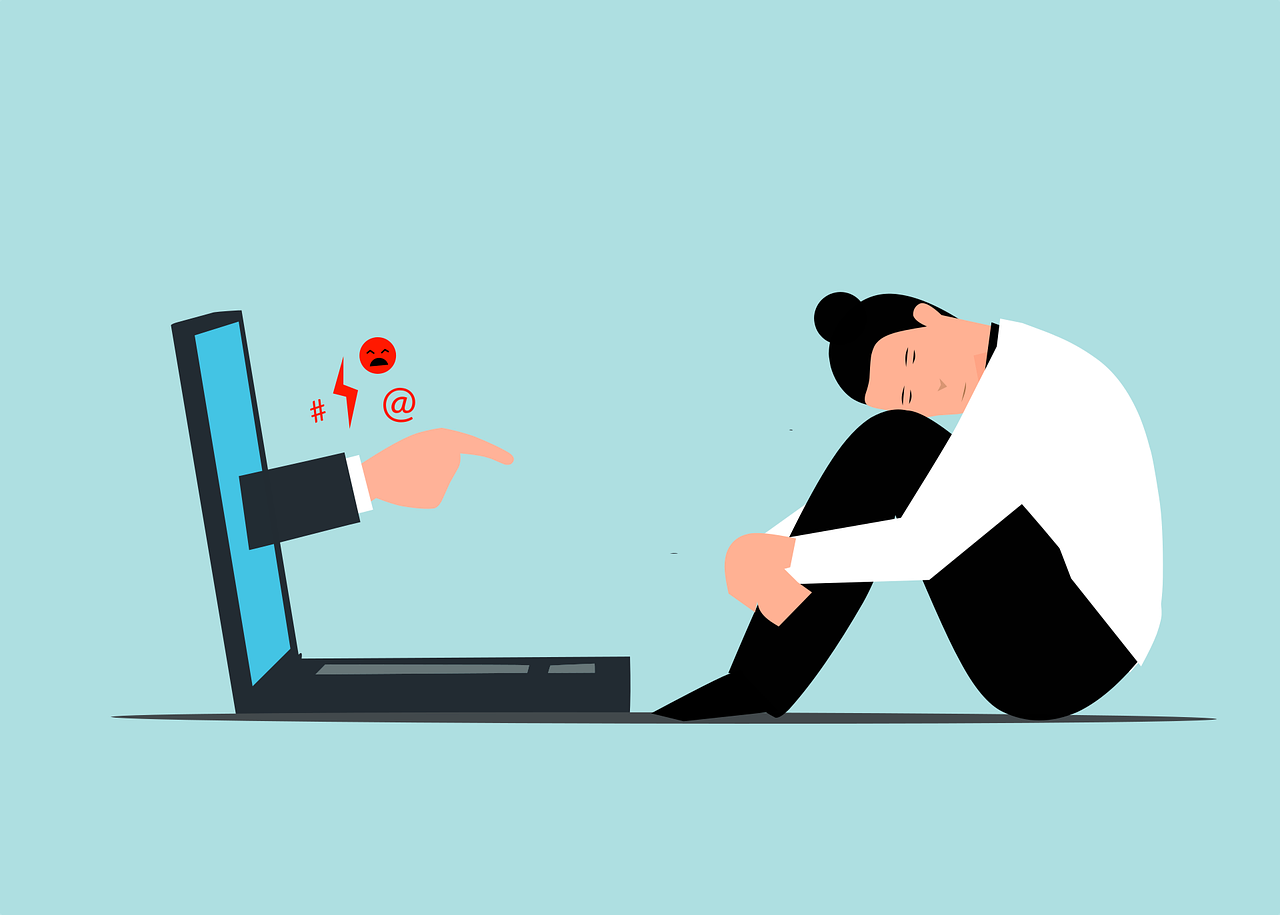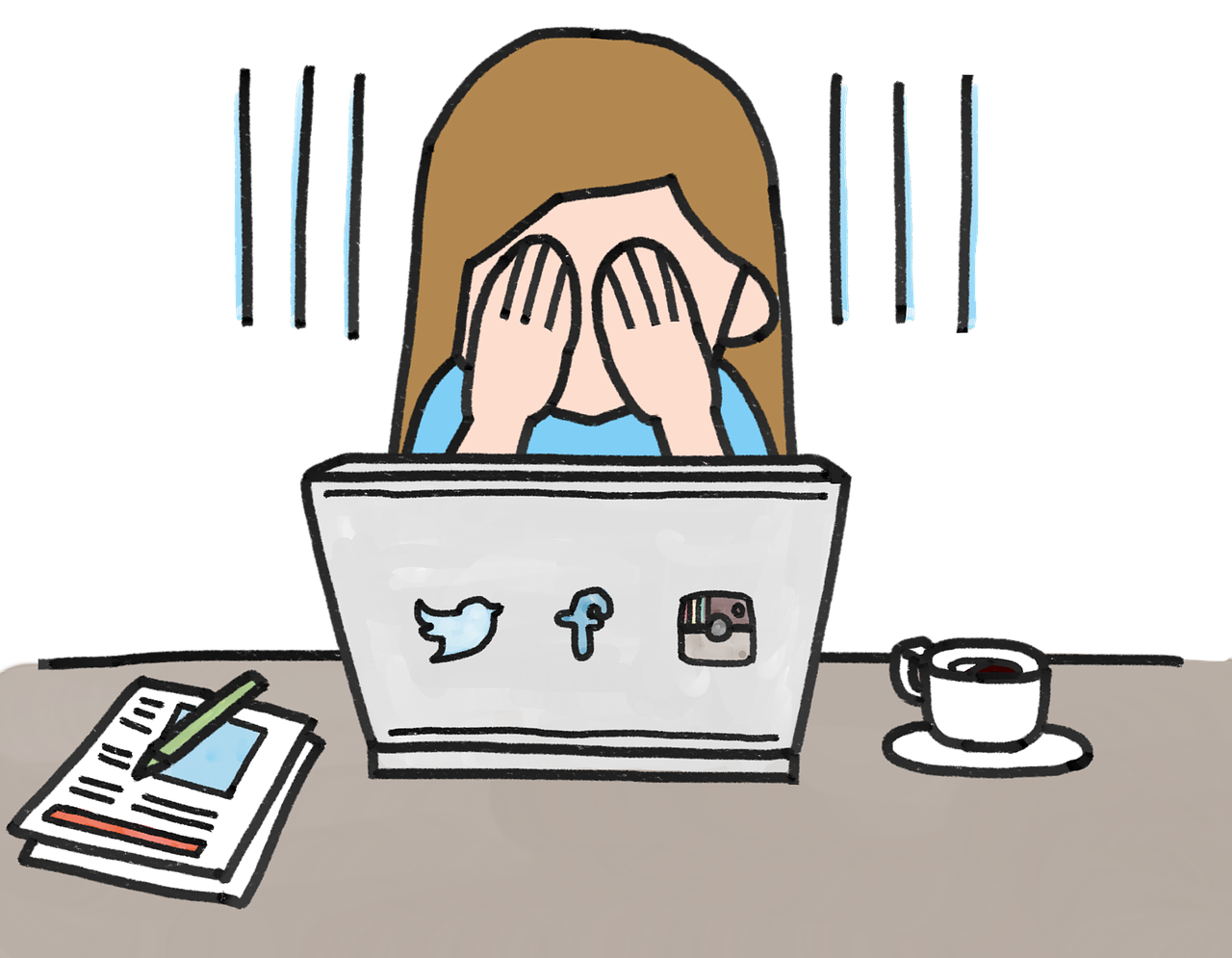Hate on Social Networks/El Odio en las Redes Sociales
Hate on Social Networks

Hello hive friends! I hope you have a happy weekend. This is the second time I post in this community and I hope to do it in more occasions. This time I would like to write about a topic that I have been thinking about for a long time, which is why do people show so much hate through social networks? It is quite common to see discontent, aggressive responses, hurtful comments, sarcasm, mockery, harassment, among others, on social networks.
I know that this topic can be quite broad in interpretations, since a large number of people have social networks and everyone handles them as they see fit, I will mention what I have seen, how I interpret it and how I usually handle my social networks.
Social networks are designed for interaction, that is, to give and receive. The main forms of feedback are through reactions and comments; content is also shared, people follow and follow us, and the most direct interaction is through private messages. I think the concept of social networking is great, what stops me to reflect is the way in which they are used.
I will start this reflection by the reactions and comments, the reactions of "like/dislike" can look harmless, but if they have a meaning that connects with the person who made a publication of any kind, it is the approval or not of a content placed to an audience in social networks. The viewer wants to express whether he likes or dislikes what he is seeing, it is a constant evaluation of everything, and the networks give the opportunity that just by clicking on an option we can already indicate if it is something we like or not, when the answer is usually negative, it is not pleasant, but it is part of the fact that what we do will not please all people.
On the other hand, the topic of comments, I see it more focused, because there are more elements involved, as opposed to just reacting to a "like/dislike". The person who comments is taking the time to stop at some publication, formulate an opinion and make it known, a remarkable fact is that the person feels that he/she has the freedom to express whatever, it is as if doing it through a social network gives him/her the "courage" to show a face that possibly in person would not show, in addition, he/she does not take into account how it will affect the person who receives such comments. Specifically, the comments I am talking about are the offensive ones, whose only purpose is to hurt the other person.
With respect to private messages, they are a completely direct way of indicating something to the other, and when they lean towards hate, by their nature of being private they are less visible, since only the sender and the receiver of the message see it, and not the general public. Inevitably the sense that it is personal is more present. The ones who mostly notice that they receive this kind of hate are the people with influence in networks.

Leaving a little bit of the forms of interaction, another important point is that we have to be aware that if we are exposed to social networks, that throws responses from the viewer, and I can understand that perhaps there is content that is not to everyone's liking, the question is that this dislike becomes an attack, something personal.
On the other hand, there are topics that I could consider delicate that generate controversy, there the reactions are charged at its maximum expression, the sides are seen, being the one who supports the idea and the one who rejects it, in those opportunities social networks seem the battlefield to demonstrate which point is right, and again it seems that in these situations the answers must be from sarcasm, rudeness, imposition, from provocation, they are power struggles. I usually see this with many topics, and I always think, is anyone going to change their opinion after all this? And I think that, whoever enters into a discussion, his intention is to want to imply that his point is the right one, and not to open up to new possibilities.
Then there are the posts where it seems that it is inevitable that reactions, comments and so on will lean towards annoyance, hatred, rejection, repudiation. This week I saw one such publication, and it was of a little dog that was killed in a rather cruel way, and in the face of this I also see that it is difficult to just ignore the situation, because there remains that lump in the throat of feelings that acts like these generate.

What do I usually do?
Normally when I don't like a content I ignore it, and if the content deserves to be denounced, I do it (photos and/or videos without consent of people with little clothes, are leaked to the internet and begin to go all over the net, when violence is promoted, topics of that nature) Why don't I like to comment on situations like that? I think it gives it more prominence and creates more controversy, so I prefer to denounce it rather than give it a value it does not deserve. When the contents are to my liking I react with a like/vote, if it moves me in a positive way I go to the next level of commenting.
Something that I consider is that the problem is not the social networks, I believe that none of them was created to promote hate, the problem is the coexistence within the networks, I think that we reflect what we are as a society in social networks, only with minor consequences such as a closing or blocking of an account.
I say this because in Venezuela hardly a cyber bullying or related things are taken seriously, as a teenager I lived a situation where a classmate created a false account and wrote offensive comments about her classmates, including me, this was denounced, but did not pass to major. Maybe in other countries it is handled differently.
The Hive community
I have been in the community for a short time, my experience here has been pleasant, so far I have not seen the first aggressive comment, I usually receive messages of welcome, affection, telling me anecdotes, all go in that direction, and the ones I have made also go in the same direction. I like that, I feel that everyone has a life with their own problems, and having a space where there is that empathy with the other, is of great value.
I am not usually one of those people who comment, but here I have done it, I have connected with stories, with reflections, with very charismatic videos, with people who close their post leaving questions, and then it provokes me to answer those questions, to comment to the person in the video how well they do it, to reflect a little and leave a contribution, to tell an anecdote that is associated with the story they have seen. And if someone takes the time to tell me a comment, I will gladly respond, and thus contribute to create a community that reflects that we are a friendly, assertive society that values the work of others and if you do not like it, there is no need to attack.
In closing I just want to say, thank you for reading my post, a hug ☺️.
El Odio en las Redes Sociales

¡Hola amigos de hive! Espero tengan un feliz fin de semana. Es la segunda vez que publico en esta comunidad y espero hacerlo en más ocasiones. En esta oportunidad me gustaría escribir sobre un tema que desde hace tiempo he estado pensando, el cual es ¿Por qué las personas muestran tanto odio a través de la redes sociales? Y es que es bastante frecuente ver descontento, respuestas agresivas, comentarios hirientes, sarcasmos, burlas, acoso, entre otros, en las redes sociales.
Sé que este tema puede llegar a ser bastante amplio en interpretaciones, puesto que, una gran cantidad de personas tenemos redes sociales y cada quien las maneja como mejor le parece, yo les mencionaré lo que he visto, cómo lo interpreto y cómo yo suelo llevar mis redes sociales.
Las redes sociales están diseñadas para que exista interacción, es decir, dar y recibir. Las principales formas de opinar son a través de las reacciones y los comentarios; también se comparte contenido, se siguen y nos siguen personas, y esta la interacción más directa que es mediante los mensajes privados. Pienso que el concepto de red social es algo genial, lo que me detiene a reflexionar es la manera en cómo se usan.
Comenzaré esta reflexión por las reacciones y los comentarios, las reacciones de “me gusta/no me gusta” se pueden ver inofensivas, pero si tienen un significado que conecta con la persona que hizo una publicación de cualquier índole, es la aprobación o no de un contenido colocado a un público en redes sociales. El espectador quiere expresar si le agrada o no lo que va viendo, es una constante evaluación a todo, y las redes dan la oportunidad de que con solo pulsar una opción ya se pueda indicar si es algo que nos gusta o no, cuando la respuesta suele ser negativa, no es agradable, pero es parte del hecho de que lo que hacemos no le agradará a todas las personas.
Por su parte, el tema de los comentarios, yo lo veo más focalizado, porque hay más elementos implicados, a diferencia de solo reaccionar a un “me gusta/no me gusta”. La persona que comenta se está tomando el tiempo de detenerse en alguna publicación, formular una opinión y hacer saber la misma, un hecho resaltante es que la persona siente que tiene la libertad de expresar lo que sea, es como si el hacerlo a través de una red social le diera la "valentía" de mostrar una cara que posiblemente en persona no mostraría, además, que no toma en cuenta cómo afectará a quien recibe dichos comentarios. Específicamente los comentarios de los que hablo son los ofensivos, que su única finalidad es hacer daño al otro.
Con respecto a los mensajes privados, son una forma completamente directa de indicarle algo al otro, y cuando estos se inclinan hacia el odio, por su naturaleza de ser privados son menos visibles, ya que solo lo ven quien envía y quien recibe el mensaje, y no un público en general. Inevitablemente la sensación de que es algo personal está más presente. Quienes en su mayoría hacen notar que reciben esta clase de odio son las personas con influencia en redes.

Saliendo un poco de las formas de interacción, otro punto importante es que tenemos que estar conscientes de que si estamos expuestos a las redes sociales, eso arroja respuestas por parte del espectador, y yo puedo entender que quizá haya contenido que no sea del agrado de todos, la cuestión es que ese desagrado se convierta en ataque, en algo personal.
Por otro lado, existen temas que podría considerar delicados que generan controversia, ahí las reacciones están cargadas en su máxima expresión, se ven los bandos, estando el que apoya la idea y quien la rechaza, en esas oportunidades las redes sociales parecen el campo de batalla para demostrar que punto tiene la razón, y nuevamente pareciera que en estas situaciones las respuestas deben ser desde el sarcasmo, las groserías, la imposición, desde la provocación, son luchas poder. Yo suelo ver esto con muchos temas, y siempre pienso ¿será que alguien va a cambiar su opinión después de todo esto? Y pienso que, el que entra en una discusión, su intención es querer dar a entender que su punto es el correcto, y no es para abrirse a nuevas posibilidades.
También están las publicaciones donde parece que es inevitable que las reacciones, comentarios y demás se inclinen hacia la molestia, el odio, el rechazo, el repudio. Esta semana vi una publicación de esa índole, y fue de un perrito que fue asesinato de una manera bastante cruel, y ante esto también veo que es difícil solo ignorar la situación, porque queda ese nudo en la garganta de sentimientos que generan actos como estos.

¿Qué suelo hacer yo?
Normalmente cuando no me gusta un contenido lo ignoro, y si el contenido amerita ser denunciado, lo hago (fotos y/o videos sin consentimiento de personas con poca ropa, se filtran a internet y comienzan a dar vuelta por toda la red, cuando se promueve la violencia, temas de esa índole) ¿Por qué no me gusta comentar en situaciones así? Pienso que le da mayor protagonismo y crea más controversia, por eso prefiero denunciar a darle un valor que no merece. Cuando los contenidos si son de mi agrado reacciono con un me gusta/un voto, si me conmueve de manera positiva paso al siguiente nivel de comentar.
Algo que considero es que el problema no son las redes sociales, creo que ninguna fue creada para promover el odio, el problema es la convivencia dentro de las redes, pienso que reflejamos lo que somos como sociedad en las redes sociales, solo que con consecuencias menores como un cierre o bloqueo de cuenta.
Digo esto porque en Venezuela difícilmente un acoso cibernético o cosas relacionadas sea tomada en serio, de adolescente viví una situación donde una compañera de clase creo una cuenta falsa y escribía comentarios ofensivos sobre sus compañeras de clases, incluyéndome, esto fue denunciado, pero no paso a mayores. Quizá en otros países sea manejado de diferente forma.
La comunidad Hive
Tengo poco tiempo en la comunidad, mi experiencia aquí ha sido grata, hasta ahora no he visto el primer comentario agresivo, suelo recibir mensajes de bienvenida, cariño, contándome anécdotas, todos van en ese sentido, y los que yo he hecho también van en la misma dirección. Eso me gusta, siento que cada quien tiene una vida con sus propios problemas, y tener un espacio donde haya esa empatía con el otro, es de gran valor.
Yo no suelo ser de las personas que comentan, pero aquí lo he hecho, he conectado con historias, con reflexiones, con videos muy carismáticos, con personas que cierran sus post dejando preguntas, y entonces me provoca responder esas preguntas, comentarle a la persona del video lo bien que lo hace, reflexionar un poco y dejar un aporte, contar un anécdota que se asocie a la historia que haya visto. Y si alguien se toma el tiempo de decirme algún comentario, gustosamente responderle, y así contribuir a crear una comunidad que refleje que somos una sociedad amable, asertiva, que valora el trabajo del otro y si no le agrada, pues no hay necesidad de agredir.
Para cerrar solo me queda por decirles, gracias por leer mi post, un abrazo ☺️.
Sigue, contacta y se parte del proyecto en:
Escribir para hacer catarsis es una excelente herramienta. Lo haces muy bien. @tipu curate 2
Upvoted 👌 (Mana: 55/75) Liquid rewards.
Muchas gracias!
Saludos! Gracias por el apoyo 🤗.
Congratulations @samantha.asami! You have completed the following achievement on the Hive blockchain And have been rewarded with New badge(s)
Your next target is to reach 1250 upvotes.
Your next target is to reach 100 comments.
Your next target is to reach 100 replies.
You can view your badges on your board and compare yourself to others in the Ranking
If you no longer want to receive notifications, reply to this comment with the word
STOPTo support your work, I also upvoted your post!
Check out our last posts:
Si quieres formar parte de nuestro trail de curación ingresa a HIVEVOTE, haciendo clic en la imagen del capybara aristocratico. Capybaraexchange tu casa de cambio, rapida, confiable y segura